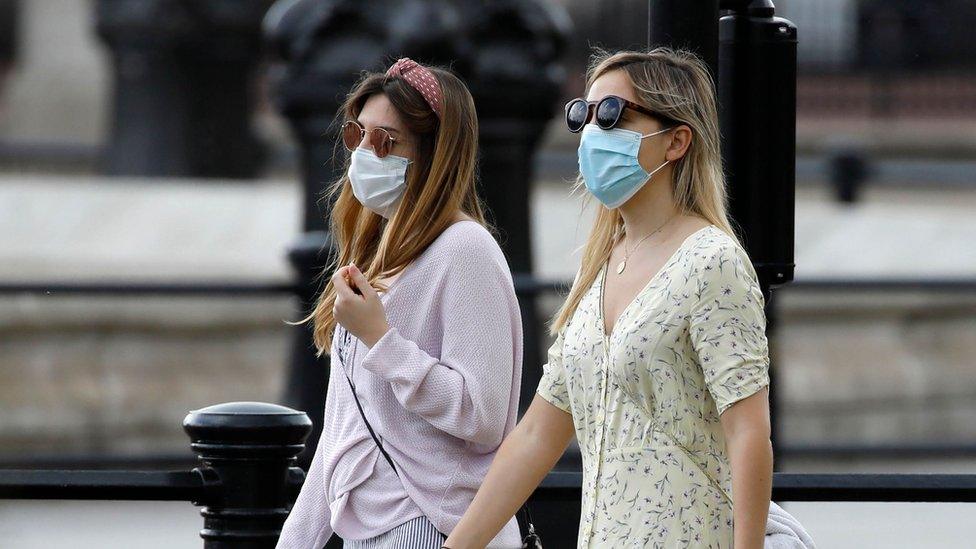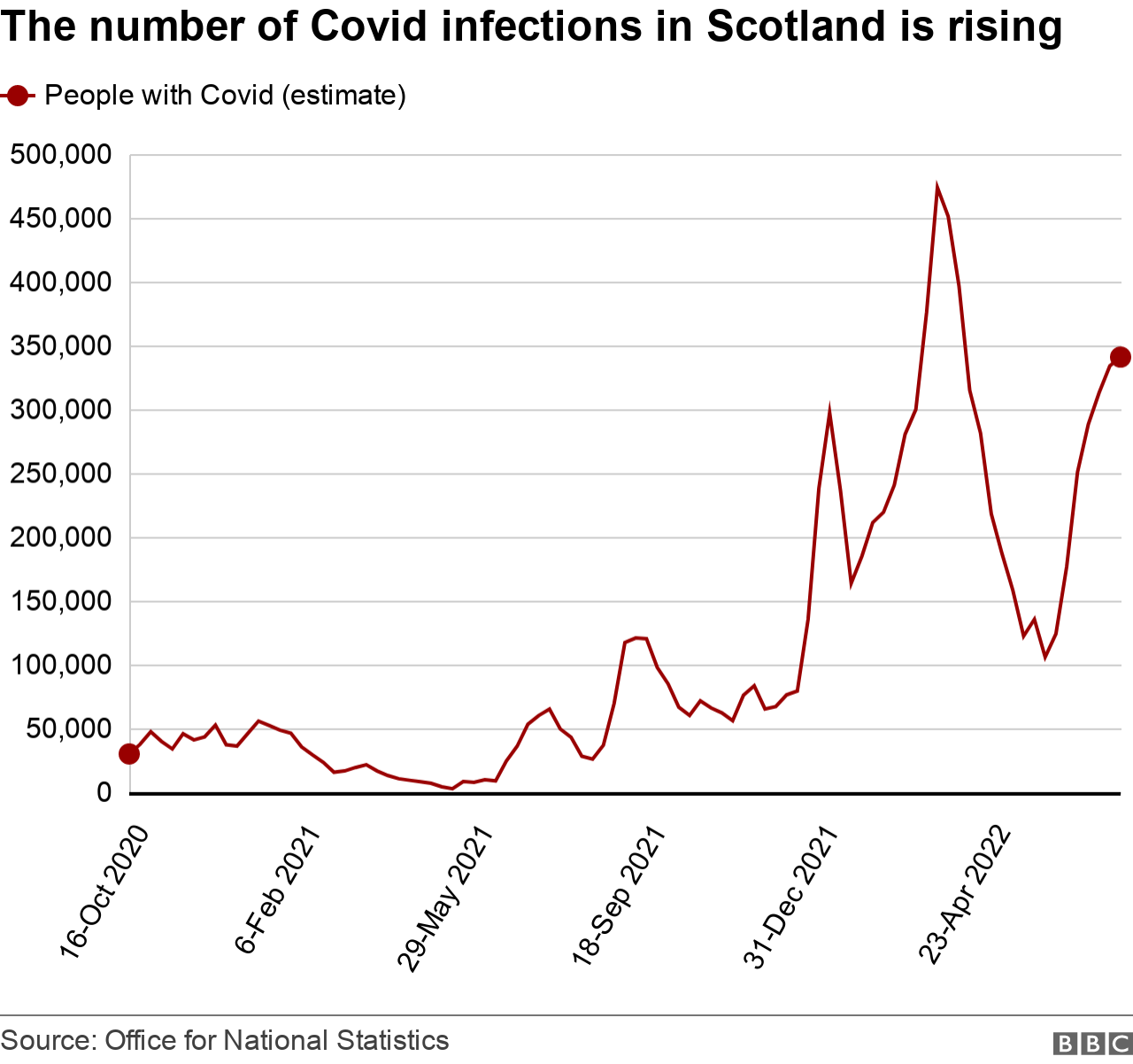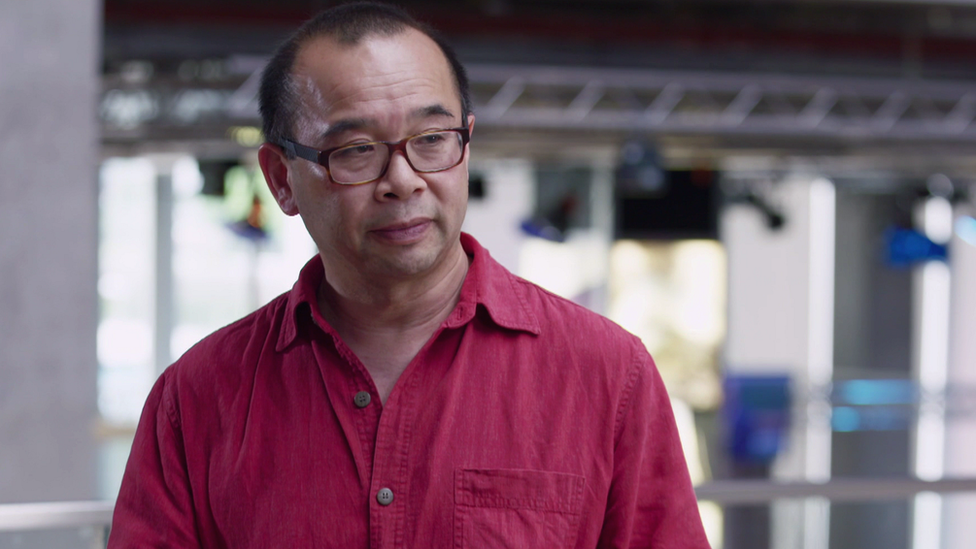Covid in Scotland: Virus cases increase for seventh week in a row
- Published
- comments

One in 15 people in Scotland were estimated to have Covid last week as cases increased for the seventh week in a row.
The Office for National Statistics (ONS) estimated that 340,900 people would have tested positive for the virus in the week ending 14 July.
This was a slight increase from one in 16 the previous week, the ONS said.
Cases are also continuing to increase in England, where one in 17 people were estimated to have the virus last week.
But the figure for Wales remained the same - one in 17 - while there was an improvement in Northern Ireland from one in 17 to one in 20.
The figures, published in the latest ONS Coronavirus Infection Survey, external, suggest about 3.8m people - one in 17 of the UK population - has the virus.
That is up by a quarter of a million - or 7% - on the week before when there were 3.5m Covid infections recorded.
The number of people testing positive across the UK has been rising since the start of June but the rate of rise is showing signs of slowing down.
Kara Steel, ONS senior statistician for the survey, said experts were seeing some uncertain trends in the latest data across the UK, as well as in some English regions and among some age groups.
She added: "It is too early to say if this most recent wave is starting to peak, but we will continue to closely monitor the data."

The current wave is being driven by the coronavirus subvariants Omicron BA.4 and BA.5, which are more transmissible than previous strains.
But high levels of Covid antibodies among the population - either from vaccination or previous infection - mean the number of people seriously ill or dying remain low.
First Minister Nicola Sturgeon said the virus was not going to disappear any time soon.
She said: "As we go into winter, we may well see further waves of Covid. It is a virus that is continuing to mutate and change and that's causing real challenges."
On Wednesday it emerged an average of 1,770 people in Scottish hospitals had the virus last week - an increase of 6.1% on the previous week, according to Public Health Scotland.
It is not known how many were being treated for Covid, or how many were receiving treatment for other conditions.
The new PHS Covid-19 statistical report, external, published on Wednesday now quotes the ONS figure for case numbers rather than its usual figure for reported cases.
The ONS sampling is considered a better indicator than the PHS data as so few people are now reporting test results.
Meanwhile, the latest National Record of Scotland (NRS) data, external revealed that as of 17 July there have been a total of 15,179 deaths registered in Scotland where Covid-19 was mentioned on the death certificate.
The number for last week, 82, was the same as the previous week.

Professor Rowland Kao said experts remain concerned about what might happen in the winter
Last week it was confirmed everyone over the age of 50 would be offered an additional Covid booster jab in the autumn.
Other groups of people at higher risk from the virus will also be given another dose of the vaccine to boost their immunity.
They include care home residents and staff, frontline health workers, carers and people with some health conditions.
Earlier Prof Rowland Kao, of the University of Edinburgh, said the numbers appeared to be declining.
The epidemiologist told BBC Radio's Good Morning Scotland programme: "Hospitalisations and deaths should follow that but we are in the middle of the summer and we still have concerns that, come the winter time, that it could rise again for a combination of reasons."
Prof Kao said variants have arisen on a "worryingly frequent basis" and he also highlighted the significance of "declining immunity" as the number of people getting vaccinated was lower than it was before.
He added: "Overall, the number of people who are getting seriously infected is far lower compared to the number being infected. But it is still substantial and there is still quite a number of people who are getting serious illness, including long Covid, who have no obvious reason why that is occurring so we need to be aware of that."
Going forward, Prof Kao said he believed there would be nothing like the level of infections that have been seen in the past as people have more immunity.
But he said it could be a rocky road as other infections, such as flu and RSV, will put the NHS under strain in the winter.
He said: "We might expect to see some additional restrictions.
"It is highly unlikely that we would see anything like we saw in the first wave."